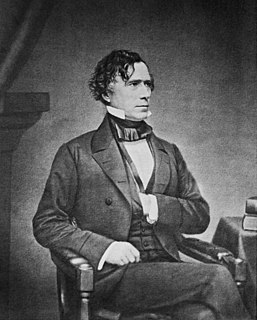A Quote by James Madison
Because the bill vests in the said incorporated church an authority to provide for the support of the poor and the education of poor children of the same, an authority which, being altogether superfluous if the provision is to be the result of pious charity, would be a precedent for giving to religious societies as such a legal agency in carrying into effect a public and civil duty.
Related Quotes
[T]he bill exceeds the rightful authority to which governments are limited by the essential distinction between civil and religious functions, and violates in particular the article of the Constitution of the United States which declares that Congress shall make no law respecting a religious establishment.... This particular church, therefore, would so far be a religious establishment by law, a legal force and sanction being given to certain articles in its constitution and administration.
Because the bill in reserving a certain parcel of land in the United States for the use of said Baptist Church comprises a principle and a precedent for the appropriation of funds of the United States for the use and support of religious societies, contrary to the article of the Constitution which declares that "Congress shall make no law respecting a religious establishment."
Strictly enforce the scale of "fixed responsibility." The first and foremost level of responsibility is with the individual himself; the second level is the family; then the church; next the community, finally the county, and, in a disaster or emergency, the state. Under no circumstances is the federal government to become involved in public welfare. The Founders felt it would corrupt the government and also the poor. No Constitutional authority exists for the federal government to participate in charity or welfare.
READILY and, I trust, feelingly acknowledge the duty incumbent on us all . . . to provide for those who, in the mysterious order of Providence, are subject to want and to disease of body or mind; but I cannot find any authority in the Constitution for making the Federal Government the great almoner of public charity throughout the United States . . . .
When we want to help the poor, we usually offer them charity. Most often we use charity to avoid recognizing the problem and finding the solution for it. Charity becomes a way to shrug off our responsibility. But charity is no solution to poverty. Charity only perpetuates poverty by taking the initiative away from the poor. Charity allows us to go ahead with our own lives without worrying about the lives of the poor. Charity appeases our consciences.
It is the interest of every man to live as much at his ease as he can; and if his emoluments are to be precisely the same, whether he does or does not perform some very laborious duty, it is certainly his interest, at least as interest is vulgarly understood, either to neglect it altogether, or, if he is subject to some authority which will not suffer him to do this, to perform it in as careless and slovenly a manner as that authority will permit.
When you live in a poor neighborhood, you are living in an area where you have poor schools. When you have poor schools, you have poor teachers. When you have poor teachers, you get a poor education. When you get a poor education, you can only work in a poor-paying job. And that poor-paying job enables you to live again in a poor neighborhood. So, it's a very vicious cycle.






























